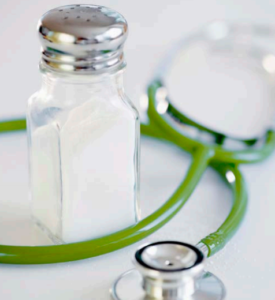February is American Heart Month. This is a great time to reflect on the effects our diet and physical activity have on our heart health. The American Heart Association is a great resource when it comes to knowing the most up to date information on cardiovascular health.
At Tri-County Health Network, our Community Health Workers (CHWs) provide heart healthy screenings to community members for free. Our screenings include a blood pressure check, and levels of cholesterol, blood glucose, and triglycerides – those numbers in combination with a brief health history, height, weight and age allow the CHW to use a calculator that can help determine a persons risk of heart attack or stroke. With that risk score, CHWs work in conjunction with the client to come up with goals around ways to improve their health – even if a person’s risk score is low.
Recently, our CHW in Montrose, Darlene Mora, was working with a client to improve his high blood pressure and dietary habits, particularly his sodium intake. The client, a male in his 70s, mentioned that he was unaware of the effects sodium intake can have on the health of your heart. At the time of the health screening the gentleman had elevated blood pressure. Darlene explain the harmful effects of excess sodium intake and how it can raise your blood pressure. They discussed reading nutrition labels and which foods to limit in order to reduce his intake. The client left feeling empowered to change his habits in order to reduce his high blood pressure and inspired to share what he had learned with his wife!
While there are many contributing factors to high blood pressure, one common contributor is high sodium intake. According to the American Heart Association, “When there’s extra sodium in your bloodstream, it pulls water into your blood vessels, increasing the total amount (volume) of blood inside them. With more blood flowing through your blood vessels, blood pressure increases. It’s like turning up the water supply to a garden hose — the pressure in the hose increases as more water is blasted through it.” High Blood pressure increases your risk of heart attack and stroke.
The American Heart Association recommends no more than 2,300 milligrams (mgs) of sodium a day and an ideal limit of less than 1,500 mg per day for most adults, especially for those with high blood pressure. Most people eat about 3,400 mg of sodium a day. Watch out for food with high sodium content like breads and rolls, cold cuts and cured meats, pizza, poultry, soup, sandwiches. Being aware of your sodium intake is a great first step in lowering high blood pressure or preventing it all together.
Still wondering why you should limit your sodium intake? Check out this handout by the American Heart Association: https://www.heart.org/-/media/data-import/downloadables/pe-abh-why-should-i-limit-sodium-ucm_300625.pdf
If you are interested in being screened by one of our amazing Community Health Workers please contact TCHNetwork’s main office, 970-708-7096 to find a CHW in your area!
-Adrienne Christy, Community Health Programs Manager


